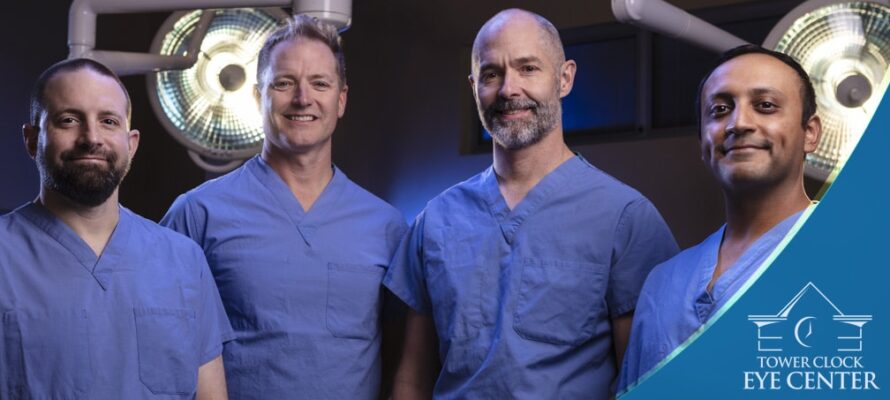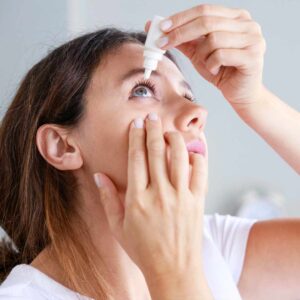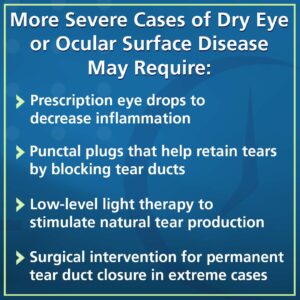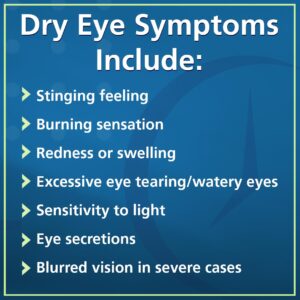

When your eyes don't make enough tears, you can end up facing the frustrating condition of dry eye. To get long-lasting relief from chronic dry eye, you need a treatment plan from a knowledgeable, experienced dry eyes doctor in Wisconsin.
Left untreated, dry eye can lead to serious inflammation, corneal ulcers and even vision loss. Tower Clock Eye Center doctors are experts in treating dry eye syndrome, a chronic, common condition that affects a wide range of people, especially older adults.
What is Dry Eye?
Every time you blink, the eye spreads tears around your cornea. These tears are the eye’s lubrication. They help maintain clear vision and, most importantly, comfort. They wash away foreign debris and help prevent infection.
Dry Eye Symptoms
Dry Eye Syndrome is usually experienced through an uncomfortable sensation in the eyes. Patients also often report these common symptoms:
- Stinging feeling
- Burning sensation
- Redness or swelling
- Fluctuation in vision
- Excessive eye tearing/watery eyes
- Sensitivity to light
- Eye secretions
- Blurred vision in severe cases
If you have any of these symptoms, it is time to speak to a doctor who can examine your eyes and diagnose the exact cause of your problems. The best dry eye treatment plan depends on a precise diagnosis.
What Causes Dry Eye Syndrome?
Tear production is a careful balance of several complex components and functions. If any part of the eye involved in tear-making is not operating perfectly, the quality of tears can cause the eyes to become dry.
Let's look at some of the causes. If you have any of these issues, you may be on the path to a diagnosis.
Screen Time and Digital Device Usage
Extended time looking at a computer screen can significantly impact your tear film, leading to dry eye issues. When focusing on digital devices, people blink less frequently, preventing proper distribution of tears across the ocular surface.
Meibomian Gland Dysfunction
The meibomian glands in your eyelids produce an oily layer of tears. When these glands don't function properly, it can lead to chronic dry and irritated eyes, often requiring treatment with prescription eye drops or artificial tears.
Contact Lens Wear

Environmental Impacts
Air conditioning, dry air, and environmental factors can accelerate tear evaporation and disrupt your tear film. Your eye doctor may recommend artificial tears or a treatment strategy that includes environmental modifications to provide long-lasting relief.
Medical Conditions
Certain autoimmune conditions like Sjogren's syndrome and rheumatoid arthritis can affect tear production and gland function. An eye doctor can diagnose these root causes through tests like the Schirmer test to measure how your body produces tears.
Medication Side Effects
Beta blockers, pain medications, and certain medications can decrease the production of tears and cause dry eye syndrome. Your doctor can help adjust your treatment options if medications are contributing to your dry eye syndrome.
Age-Related Changes
Natural aging can reduce the amount of tears your body creates and affect the quality of your tear film. This chronic condition often requires ongoing management with artificial tears or other dry eye treatment options like punctal plugs.
Anatomical Factors
Problems with your eyelids or tear ducts can prevent proper distribution of tears across the ocular surface, leading to symptoms of dry eye. Your eye care professional can evaluate these structures to determine if they're contributing to your dry eye diagnosis.
Gender-Related Risk
Women are more likely to develop dry eye
Thyroid Conditions
Thyroid disorders can significantly impact your tear film and lead to chronic dry eye. A doctor may work with your endocrinologist to develop a treatment strategy that addresses both your thyroid condition and dry eye symptoms.
Diabetes
People with diabetes often experience systemic dryness which can lead to dry eye issues.
Blepharitis
This inflammation of the eyelids can disrupt meibomian gland function and lead to dry eye syndrome. Your doctor may recommend specific eyelid hygiene practices along with artificial tears to decrease inflammation.
Laser Eye Surgery History
Previous laser eye surgery procedures, such as LASIK or PRK, can affect tear processes and lead to dry eye symptoms. Your eye care team might recommend punctal plugs or prescription eye drops to manage post-surgical dry eye care.
Dry Eye Diagnosis & Treatment Options
Before starting treatment, our eye doctors perform an extensive evaluation to assess your tear film quality and tear production. We also review your medical history to identify any root cause of your symptoms, such as autoimmune conditions or medications.
Treatment Options for Mild Dry Eye Symptoms
For mild cases of dry eye syndrome, we often begin with conservative treatments:
- Artificial tears (preservative-free) to supplement natural tear production
- Warm compresses to improve meibomian gland functionality
- Eyelid hygiene routines to maintain gland health
- Environmental modifications to minimize air conditioning and other irritants
- Proper hydration to support natural tear film production
Advanced Dry Eye Treatment

- Prescription eye drops to decrease inflammation
- Punctal plugs that help retain tears by blocking tear ducts
- Low-level light therapy to stimulate natural tear production
- Surgical intervention for permanent tear duct closure in extreme cases
- Placement of bandage contact lens or amniotic membrane to help the eye heal
Ongoing Management
Tower Clock Eye Center doctors will monitor your progress and adjust your treatment plan as needed. Long-term relief often requires a combination of treatments and lifestyle modifications. Regular follow-up visits help ensure your eye treatment remains effective and your symptoms improve over time.
Contact Our Eye Care Center Today
If you are experiencing dry eye symptoms, call Tower Clock Eye Center to schedule your dry eye exam at: 920-221-0301.

